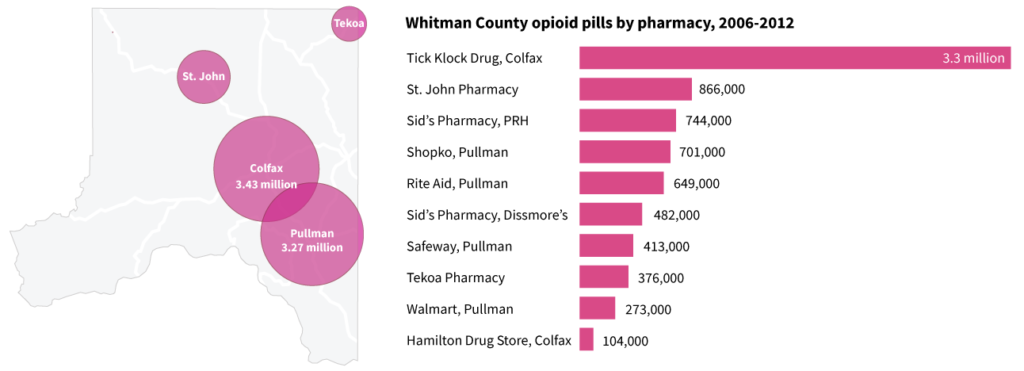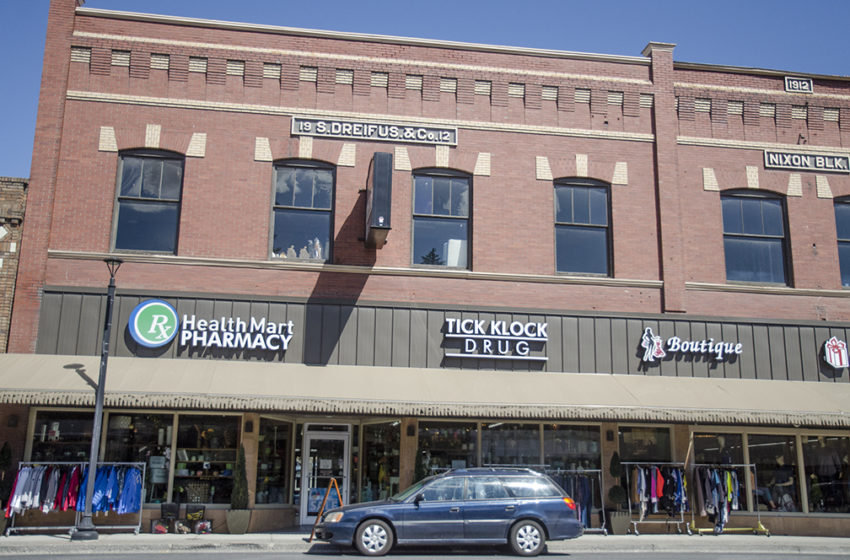Newly released national data tracks how nearly 8 million prescription pain pills flowed through Whitman County pharmacies from 2006-2012, providing some historic insight into the local evolution of the opioid epidemic.
Records show the county received enough opioid drugs to provide every resident with 26 pills a year during that time. Though the listings end in 2012, the data illustrates how doctors increasingly leaned on the highly addictive painkillers prior to a shift in national awareness. Families and first responders continue to deal with the fallout.
Whitman County last year joined nearly 2,000 other government entities in a lawsuit against Purdue Pharma and other painkiller distributors over their roles in fueling the opioid crisis. The first of those proceedings heads to trial in October.
That lawsuit cites nine Whitman County deaths linked to opioid use from 2015-2017.

The massive database, created by the Drug Enforcement Administration and released last week by The Washington Post and Charleston Gazette-Mail, logged the manufacture and distribution of opioid-based pain pills such as oxycodone and hydrocodone nationwide.
The vast majority of local pills tracked to Colfax pharmacy Tick Klock Drug, which data shows received more than 3.3 million pills from 2006-2012. The records indicate Tick Klock Drug ordered more pills during that time than eight Pullman pharmacies combined. The St. John Pharmacy reported the second highest overall numbers with more than 866,000 pills.
Tick Klock Drug owner Mark Johnson said his shop serves people from Colfax as well as distant rural areas of the county, including many patients who engage in hard manual labor, farm work or suffer chronic pain as they age. He noted many industry practices had also changed since 2012.
“At that time, there was probably not as much of an emphasis on addiction,” he said. “Those [pill distribution] numbers have definitely decreased significantly.”
Tick Klock does not have any formal partnership with Whitman Hospital & Medical Center, Johnson said, but his shop serves many patients from local physicians. As doctors have come to recognize the risks of opioid abuse, they have become more selective with its use. Johnson said pharmacies also scrutinize such prescriptions more closely now and will report irregularities.
In 2011, the state launched a mandatory Prescription Monitoring Program that now requires daily reports on painkiller distribution. Johnson said pharmacists can also now see whether a customer has filled a similar prescription from another doctor at a different pharmacy.
“It has become a much better system for tracking individual patients’ narcotics,” he said of the monitoring program. “It’s definitely a helpful thing.”
Washington state Department of Health data from the end of 2018 shows that about 71 out of every 1,000 Whitman County residents received a prescription for opioids in the most recent quarterly report — slightly above the state average rate of 69 per 1,000 people. Whitman County residents older than 75 reported the highest rates with 185 prescriptions per 1,000.
The state also tracks opioid overdose deaths and hospitalizations. Preliminary county figures list one non-heroin opioid overdose death in 2018, two in 2017 and one in 2016. Another three deaths were linked to heroin during that time. Records list about 11 hospitalizations related to non-heroin opioid overdoses from 2015-2017.

In the 132-page lawsuit complaint, Whitman County officials cited ongoing expenses and damages from the over-marketing and prescribing of addictive painkillers:
“Opioid abuse in Whitman County has affected Plaintiff in numerous ways, not only through the need for increased emergency medical services,” the complaint states, “but also through increased drug-related offenses affecting law enforcement, corrections, and courts, and through additional resources spend on community and social programs, including for the next generation of Whitman county residents, who are growing up in the shadow of the opioid epidemic.”
The complaint alleges increases in drug-related criminal charges, child dependency cases and the resources spent running two needle exchange programs. It also lists costs to equip and train Whitman County sheriff’s deputies in the use of naloxone, or Narcan, to treat overdoses.
The sheriff’s office did not immediately reply to a request for any number of Narcan uses in recent years. (Update, July 27: Sheriff Brett Myers reported deputies have not yet had to use it.) The Pullman Police Department reported officers had used Narcan on two occasions in 2018 and one time so far this year.
For more on this issue, check out a recent Spokesman Review story about a Pullman woman’s efforts to turn around her addiction from inside the Whitman County Jail as well as a Lewiston Tribune overview on the regional effects of opioids.

Instead of cracking down on the drug stores (as they’re just doing thier jobs. Maybe they should Crack down on the Thieves who steal it. I had severe chronic back pain before it was finally fixed . (it still hurts, but not as bad) But I started having my pills STOLEN. That’s nobody’s fault but the dang addicts and pill pushers and dealers. I’m sorry but it is possible for people to take these drugs and not abuse them. If the abusers and dealers have no consequences, they won’t quit. How is that anyone’s responsibity but their own and law enforcements job to enforce it. All this does is make it harder for the people in Chronic pain, who need it, to get it.
I agree. The Tick Clock drug store in Colfax is the Only drugstore in Colfax. Pullman drugstores when added together are in the same substantive totals attributed to Colfax when added together. As far as we Colfax residents are concerned, all those doctor’s involved here require strict yearly even weekly contracts to their patients which are indicated to have issues with them. Get the facts straight please. During 2012 Hilton drugs went out of business. Thus should not signify.
Narcan is also a dangerous remedy as it places the patient in immediate severe withdrawal and can also cause death.
The laws of this state have Not been comprimised by our pharmacy! They have, if anything become more strict in enforcing the law.
Thanks for the good article; I am not sure why the above comments have such a critical tone. It’s a straight story and I appreciate the quotes from Mark Johson, and the links to other sites. Here’s hoping this data- and the additional steps taken by pharmacies, doctors, and the goverment- will have a positive impact on our communities and the devastating effects of opiod addiction.
These numbers seem very very low compared to West Virginia. Sounds like Whitman Country just wants to tap into some of the law suit money.
I know of residents in Colfax that have reported illegal drug use and possible sales and it seems some of these suspect users and dealers go unchecked.
I heard one officer comment that Colfax knows it has a small problem but that it’s under control. We cannot let this problem grow because all of a sudden there is an infestation and all the law abiding, tax paying citizens are forced out.